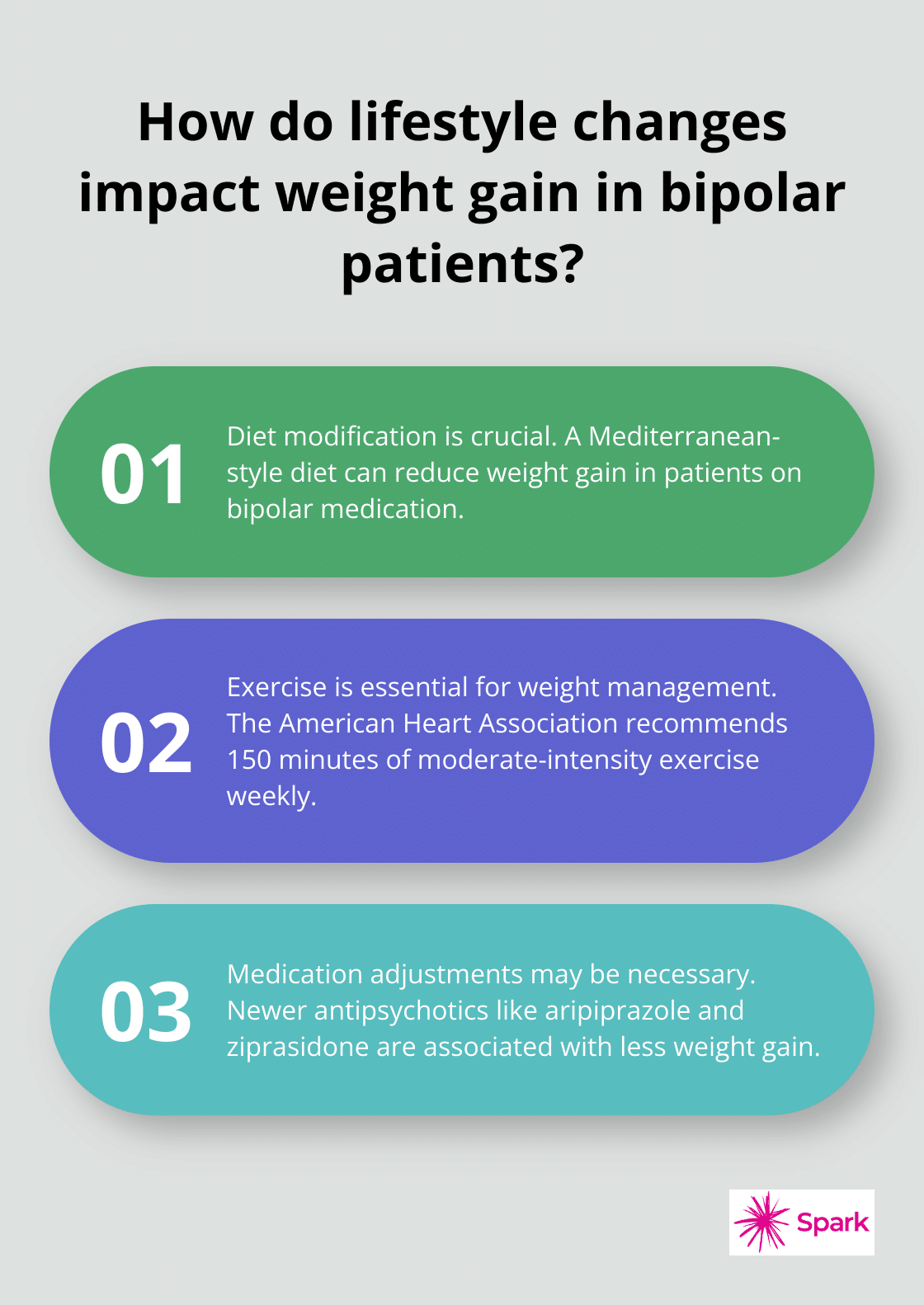At Spark Healthcare, we understand the challenges of managing bipolar disorder while dealing with medication-related weight changes.
Many patients seek information about bipolar medication that causes weight loss, as weight gain is a common side effect of several treatments.
This blog post explores the connection between bipolar medications and weight, offering strategies for managing your weight while maintaining effective treatment.
We’ll also discuss emerging research on weight-neutral and weight-loss-promoting options to help you make informed decisions about your care.
Why Do Bipolar Medications Affect Weight?
The Weight Gain Culprits
Bipolar medications can significantly impact body weight, often leading to weight gain. This side effect concerns many patients and affects treatment adherence and overall health.

Several bipolar medications cause weight gain. Lithium, a mood stabilizer, increases appetite and slows metabolism. Antipsychotics like olanzapine and quetiapine associate with substantial weight gain.
Valproic acid, another mood stabilizer, causes weight gain in up to 30% of patients. Even some antidepressants used to treat bipolar depression (such as paroxetine) lead to weight increases.
Understanding the Mechanisms
The reasons behind medication-induced weight gain involve complex processes. Some drugs increase appetite, leading to higher calorie intake. Others affect metabolism, making it harder for the body to burn calories efficiently. Certain medications cause fluid retention or changes in how the body processes and stores fat.
Health Implications
Weight gain from bipolar medications isn’t just a cosmetic concern. It leads to serious health issues like diabetes, cardiovascular disease, and metabolic syndrome.
Treatment Challenges
This weight gain often discourages patients from sticking to their treatment plans. This non-adherence can lead to mood episode relapses and hospitalizations.
Balancing Treatment and Side Effects
Healthcare providers recognize the importance of addressing these weight concerns while maintaining effective bipolar treatment. They work closely with patients to find the right balance between symptom management and minimizing side effects. The next section will explore strategies for managing weight while on bipolar medication, offering practical solutions to this common challenge.
Managing Weight on Bipolar Medication
Tailoring Your Diet
A balanced diet plays a vital role in weight management. Patients should focus on whole foods, lean proteins, and plenty of fruits and vegetables. Reducing processed foods and sugary drinks can make a significant difference. A study in the Journal of Clinical Psychiatry found that patients who followed a Mediterranean-style diet while on bipolar medication experienced less weight gain.

Portion control is essential. Using smaller plates and measuring food can prevent overeating. Keeping a food diary helps track intake and identify patterns. Many patients find apps like MyFitnessPal useful for this purpose.
Incorporating Regular Exercise
Exercise not only helps with weight management but also improves mood and overall well-being. The American Heart Association recommends at least 150 minutes of moderate-intensity exercise per week.
For those new to exercise, starting small can make a difference. A 10-minute daily walk is a good beginning. Gradually increasing activity level is key. Swimming, cycling, and yoga are excellent low-impact options that many patients enjoy.
Medication Adjustments
If weight gain persists despite lifestyle changes, patients should discuss medication adjustments with their psychiatrist. Some newer antipsychotics (like aripiprazole and ziprasidone) are associated with less weight gain.
Combining medications can sometimes help. A study in the American Journal of Psychiatry found that adding metformin to bipolar treatment reduced weight gain in some patients.
It’s crucial to note that patients should never stop or change their medication without professional guidance. Healthcare providers work closely with patients to find the right balance between effective symptom management and minimizing side effects.
Seeking Professional Support
A multidisciplinary approach often yields the best results. Working with a nutritionist or dietitian who specializes in psychiatric medications can create a personalized meal plan that complements treatment.
Support groups provide valuable insights and motivation. Many patients find strength in sharing experiences with others facing similar challenges.
Regular check-ins with healthcare providers are essential. They monitor weight, adjust treatments as needed, and address concerns promptly. Open communication is key to successful weight management while maintaining effective bipolar treatment.
As we explore these strategies, it’s important to consider the latest research on weight-neutral and weight-loss-promoting bipolar medications. The next section will discuss emerging options that may offer new hope for patients struggling with medication-induced weight gain.
New Bipolar Medications: Advancements in Weight Management
Weight-Neutral Options Show Promise
Recent developments in bipolar medication research focus on effective treatments that minimize weight gain side effects. Lurasidone, FDA-approved in 2013 for bipolar depression, demonstrates minimal impact on weight. A Journal of Clinical Psychiatry study reported patients on lurasidone gained an average of only 0.7 kg over 6 months (compared to 2.0 kg with quetiapine).

Cariprazine, another newer antipsychotic, shows a neutral effect on weight in bipolar patients. Research in the Journal of Affective Disorders found cariprazine-treated patients experienced no significant weight changes over 16 weeks of treatment.
Innovative Drug Combinations Yield Results
Combining medications sometimes produces better weight management outcomes. An American Journal of Psychiatry study explored adding topiramate to mood stabilizers. Patients who received topiramate lost an average of 1.2 kg, while those on placebo gained 0.3 kg over 12 weeks.
Metformin use alongside antipsychotics also shows promise. A PLOS One meta-analysis found metformin effectively reduced antipsychotic-induced weight gain by an average of 3.3 kg compared to placebo.
Ongoing Research Explores New Frontiers
Clinical trials continue to investigate more options for weight-friendly bipolar treatments. The National Institute of Mental Health currently funds a study on the effects of a glucagon-like peptide-1 receptor agonist on antipsychotic-induced weight gain in bipolar patients.
Johns Hopkins University researchers investigate the potential of ketogenic diets in conjunction with mood stabilizers to manage both bipolar symptoms and weight. Early results suggest this approach may offer dual benefits, but more extensive studies are needed.
Personalized Medicine Approaches Gain Traction
Genetic testing may soon predict which patients are most likely to experience weight gain from specific medications, allowing for more tailored treatment plans. This personalized approach could revolutionize bipolar medication management.
These emerging options offer hope for improved weight management in bipolar treatment. However, patients should work closely with their healthcare providers to find the most effective treatment plan for their individual needs.
Final Thoughts
Managing weight while taking bipolar medication presents challenges, but patients have more options than ever. Lifestyle changes, emerging weight-neutral drugs, and personalized treatment plans can help address weight concerns. The primary goal remains effective symptom management, yet new research offers hope for balancing mental health needs with physical well-being.

Patients struggling with weight issues related to bipolar medications should seek professional help. At Spark Mental Health, we offer telepsychiatry services to help navigate these challenges. Our experts work with you to find the right balance of medications, lifestyle changes, and therapeutic support.
Your mental health journey is unique, and finding a treatment plan that works for both mind and body is possible. While some patients inquire about bipolar medication that causes weight loss, it’s essential to focus on overall health and effective symptom management. Don’t hesitate to reach out for support – your well-being matters.






